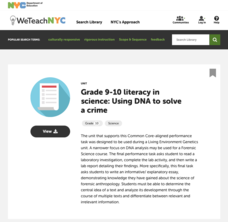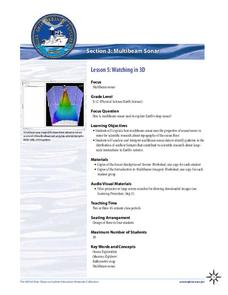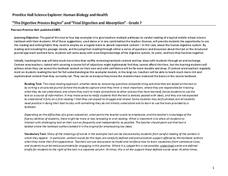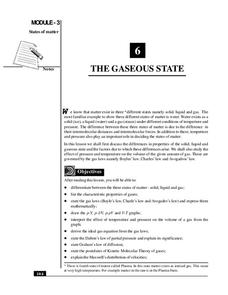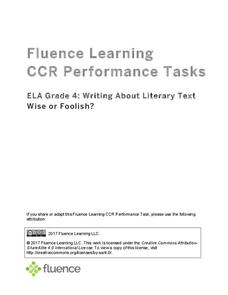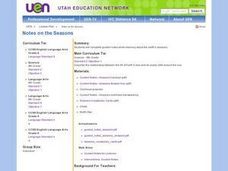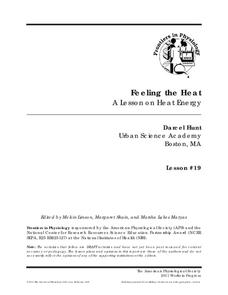New York City Department of Education
Grade 9-10 Literacy in Science: Using DNA to Solve a Crime
Scholars become detectives and use science to solve a crime! A complete unit introduces DNA and includes hands-on activities that have learners model DNA and extract it from different food types. A culminating activity challenges...
Curated OER
Dante's Peak Movie Review
Middle or high school volcanologists watch the 1997 film, Dante's Peak. They make observations as they watch and then write a movie review, focusing on what was accurately represented. They also point out what facts were stretched by...
Curated OER
Raven Chapter 14 Guided Notes: DNA, the Genetic Material
Because it is heavily focused on the contributors to DNA theory, this worksheet may be more of an enrichment than a fundamental support to your genetics curriculum. Though it does query learners about DNA structure, replication, and...
American Chemical Society
Dissolving a Substance in Different Liquids
Second of six lessons in a unit on dissolving, this one focuses on how sugar behaves in different liquids. Learners stir it into water, alcohol, and oil and make observations. This lesson can stand alone, but is best used as part of the...
Curated OER
Plate Tectonics
Help young scientists piece together the theory of plate tectonics with this comprehensive collection of materials. Whether your are looking for worksheets, hands-on activities, or assessments, this resource has everything a science...
International Technology Education Association
Become a Weather Wizard
Accurate weather forecasting is something we take for granted today, making it easy to forget how complex it can be to predict the weather. Learn more about the terms and symbols used to forecast the weather with an earth science lesson...
Illustrative Mathematics
Accuracy of Carbon 14 Dating II
The scientific issue of carbon-14 dating and exponential decay gets a statistics-based treatment in this problem. The class starts with a basic investigation of carbon content, but then branches out to questions of accuracy and ranges of...
Berkshire Museum
Nature Journaling: Experience the Outdoors Through Writing and Drawing
Step into the great outdoors and develop young scientists' skills of observation with a nature journaling lesson. Given a specific focus or goal, children practice making and recording observations of nature through written descriptions...
NOAA
Watching in 3D
Bring the ocean floor to life! Earth science scholars discover the process of deep sea mapping in the third installment in a series of five lessons about ocean exploration. The teacher's guide includes helpful resources, worksheets, and...
Curated OER
Exam Review: Chemistry Calculations
In this chemistry calculations review worksheet, students solve 33 review problems about titrations, precipitates, pressure and volume of gases, combustion reactions, heat of combustion, molar concentrations and molecular formulas.
Savvas Learning
"The Digestive Process Begins" and "Final Digestion and Absorption"
Want your class to digest text more thoroughly? Middle schoolers learn about the digestive system in the lesson and reinforce informational text reading skills through a variety of strategies. They engage in a close reading approach,...
National Institute of Open Schooling
The Gaseous State
Sixth in a series of 36, this lesson focuses on gases and their behavior in given situations. Learners review the states of matter and then focus on gases, specifically learning Boyle's, Charles's, Avogadro's Laws, Dalton's, and Graham's...
American Physiological Society
How Does the Density of a Liquid Affect the Buoyancy of an Object?
Here's a lesson plan that will really float your boat! Introduce physical science scholars to the relationship between buoyancy and density through an assortment of individual and collaborative exercises. Lab groups work together to...
Biology Junction
Arthropods
Even the creepy crawlers have pretty amazing anatomy! A thorough lesson describes characteristics of arthropods with an emphasis on their structures. Beginning with a review of the taxonomy hierarchy, the lesson explains the different...
Science Geek
Balancing Chemical Equations
Balancing equations means conserving mass; use the presentation to help learners practice this concept. The resource includes 56 equations for your class to practice balancing. Scholars focus on one reaction type at a time. Groups of...
Fluence Learning
Writing About Literary Text: Wise or Foolish?
A three-part assessment promotes reading comprehension skills. Class members read literary texts and take notes to discuss their findings, answer comprehension questions, write summaries, and complete charts.
Teach Hub
Super Bowl Classroom Activities
Need some help getting young football fans to focus on something besides the Super Bowl? Use a list of football-themed activities for art, math, science, nutrition, language arts, and social studies to get their heads in the game!
Curated OER
Notes on the Seasons
Students complete guided notes while learning about the earth's seasons.
American Physiological Society
Sticky Adaptations A Lesson on Natural Selection
Now you see it, now you don't! The stick bug exhibits the ability to disappear into a wooded environment. Why does this adaptation manifest in some species, but not in others? Life science high schoolers explore animal adaptations in...
Curated OER
Cloning Around
Review concepts of cloning and genetic engineering and participate in a round-table discussion based on the ethics and potential of cloning with your class. Each learner then writes a formal essay on the topic, stemming from the debate.
Minnesota Literacy Council
Scientific Method
Here is a resource with a descriptive approach to explaining the scientific method. It's simple, but effective for both introduction and reinforcement of this concept.
Cornell University
Wasps and Ladybugs
Can a good bug ever become a bad bug? An elementary entomology resource explores what to do when too many ladybugs or too many bees are in your home and can become a problem.
American Physiological Society
Feeling the Heat
How do the changing seasons affect the homes where we live? This question is at the forefront of engineering and design projects. Challenge your physical science class to step into the role of an architect to build a model home capable...
University of Washington
Kepler’s Laws
Introduce your physics or astronomy class to Kepler's laws of planetary motion with this straightforward worksheet. It covers the basic concepts of each and has learners answer questions to demonstrate their grasp on them. You could use...


